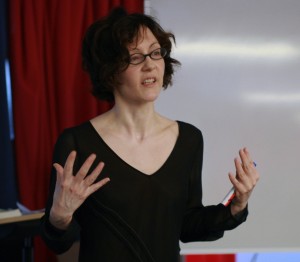
In 1966, Romania’s dictator Nicolae Ceausescu issued the 770 Decree, and with it an entire generation came into being; a generation subsumed under the derisory name of “The Decree Generation”. The general prohibition of abortion, along with the lack of availability of contraception, represented an extension of state power into the intimate realm of the body, systematically enforcing the subordination of women to a single primary function: the bearing of children.
Children born in the years from 1972 to the late 1980s were used to hearing as early as kindergarten that Ceausescu was their father: “in many cases, this is in a macabre sense true,” concludes the Nobel Laureate Herta Mueller in the essay “Tod oder Knast oder Kinder,” first written for the Berlin Tageszeitung newspaper in 1988, which Catherine Toal translated for discussion in one of the Annual Conference seminars.
The seminar aimed to explore the features of Mueller’s technique of evoking the totalitarian restrictions governing the fate of women’s bodies. Just as the 770 Decree brutally and unrelentingly asserted its influence over women’s lives, the narrator eschews lyrical description in favour of a lapidary style: short sentences, harsh sounds, and an abrupt and apparently matter-of-fact introduction of character and situation.
Indeed, the form of Mueller’s portrayal imitates the approach of secret-service sponsored reportage on the everyday activities of citizens, the documents which recorded even their smallest movement or most trivial conversation with a view to discovering dissident intention. Like such reports, Mueller’s narrative accumulates small anecdotes, from the story of a student posthumously expelled from school after a failed self-induced abortion, to the story of a man who boasts that he knows how to solve the problem of unwanted pregnancy “himself,” by hitting his wife twenty times with the cellar door.
Rather than exercising a malign suspiciousness, the reader’s task is to divine the depths of suffering visible beneath the details chronicled, and also, ultimately, the inescapable relevance of the Decree, and the aims and attitudes which created it, to every aspect of life. Through the anecdotes, Mueller gradually builds a representation of a subterranean female world in which secret codes, methods, and actual recipes for coping with the official state policy had to be devised.
Her approach culminates in a bald enumeration of the various ways in which an abortion can be induced and their degrees of dangerousness, e.g., “insert the plastic tubing of a round knitting needle into the uterus” (‘medium’ on the scale of threat to the woman’s health and survival). Once the ‘recipe’ and the conditions which make it necessary have been described, the reader is ready to decode anecdotes which do not seem explicitly to deal with the problem of the Decree, and yet which turn out to have it as their unmentioned subtext.
The objectifying style of Mueller’s narrative parallels the objectification undergone by individuals during the years of communism. The sharpness of Mueller’s tone suggests a separation of the body from the mind, indicating that the narrator’s creation of a distance from herself is the necessary condition for the communication of her experience and that of those around her.
In her essay, as throughout her work, Mueller renders the image of a culture of mistrust that penetrates one’s very being. Fearful, suspicious, and resigned, Mueller’s Romania is tragically portrayed as, to borrow her words, a nation of subjects rather than of individuals.
Catherine Toal’s seminar brought to light both “the concentration of poetry and the frankness of prose” for which the Nobel Committee awarded the prize to Herta Mueller.
by Diana Martin (AY ’10, Romania)
